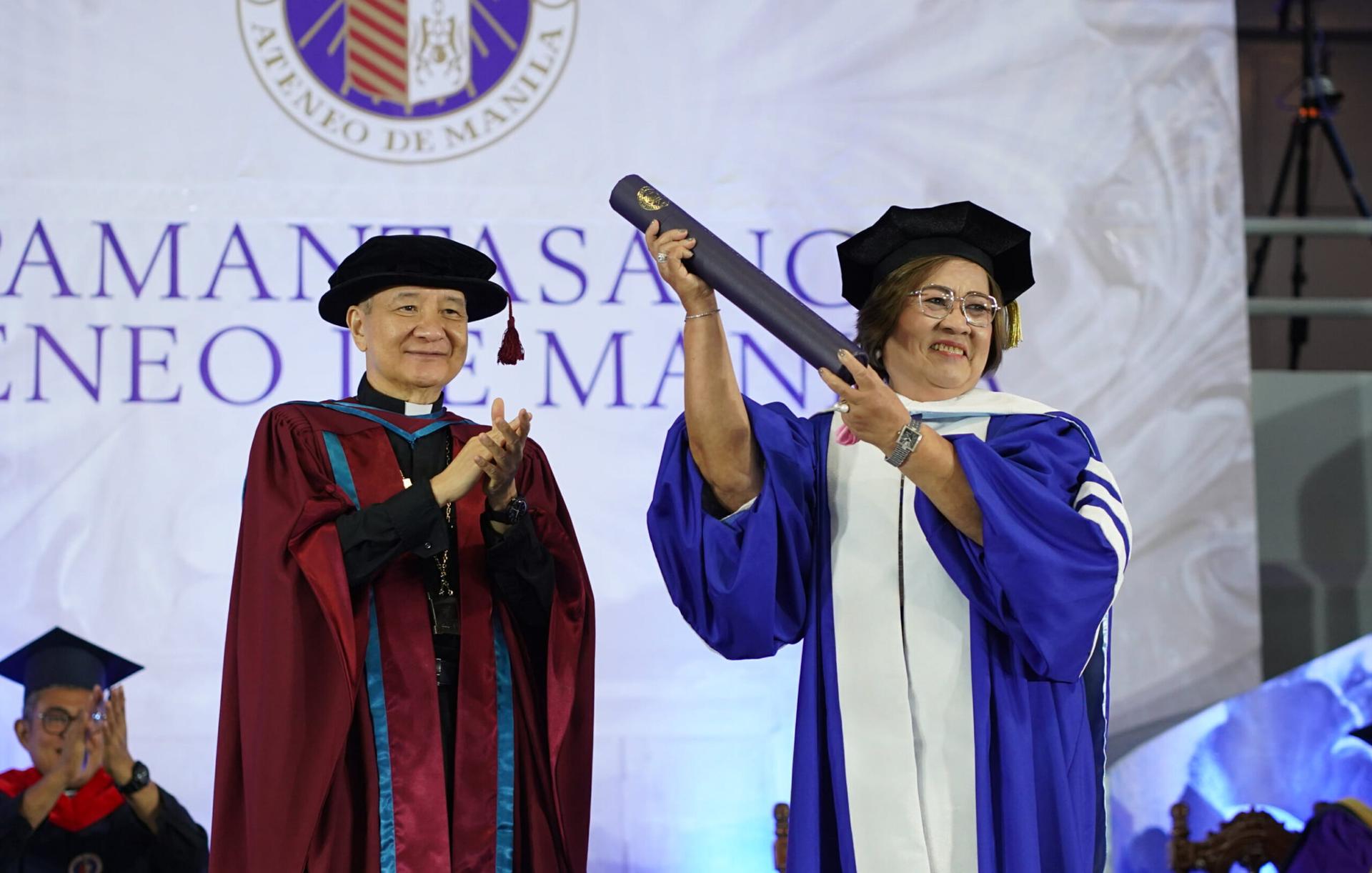MANILA, Philippines – Ateneo de Manila University, the leading Jesuit school in the Philippines, awarded an honorary doctorate in sociology to former senator Leila de Lima, who was jailed for nearly seven years under former president Rodrigo Duterte.
The 65-year-old De Lima, one of Duterte’s fiercest critics, received her honorary doctorate and delivered a speech before graduating Ateneo students on Friday.
Ateneo de Manila, founded by Spanish Jesuits in 1859, is known for its emphasis on social justice, and has produced illustrious figures such as national hero Jose Rizal and Catholic leaders such as Cardinal Luis Antonio Tagle and Cardinal Pablo Virgilio David.
Duterte, 80, is himself a product of a Jesuit institution — Ateneo de Davao University, in the southern Philippines — but claimed he was abused by an American Jesuit priest in high school. He has often cited this incident in lashing out at Catholic priests.
In a 20-minute speech on Friday, De Lima referred to Duterte, whom she once called her “chief persecutor,” and reflected on lessons of hope while in detention.
In her speech on Friday, De Lima recalled “how fear was replacing the law, how due process was being exchanged for dead bodies dumped on sidewalks,” even at the start of Duterte’s six-year presidency in 2016.
“This was a crisis of our humanity, more than mere politics. It was a blatant assault on the very dignity of life, a systematic dismantling of the foundations of justice and compassion that should define any civilized society,” De Lima said.
The former senator fought this “battle for the soul of our nation,” although it came at a cost.
“Because I refused to accept silence as an option, they came for me. I was made public enemy number one. I was vilified. My character was assassinated,” De Lima said, noting that she was jailed over trumped-up charges of drug trafficking.
“But a strange thing happened in that lonely cell. Hope found me. Before, I was not prayerful. But prayer became a ritual of resistance. Every prayer was a declaration: I am still alive. And I will not give up,” De Lima said. “It was a quiet rebellion of the soul.”
“I rediscovered a resilience I didn’t know I possessed, a deep well of inner fortitude emerging in the absence of external distractions. I found solace in the smallest things — a sliver of sunlight, the rustle of leaves, the rhythm of my breath. In this forced solitude, my convictions were forged into something stronger, clearer, more resolute,” De Lima said.
She said that “the system tried to break me” for 2,454 days. “And then, I walked free. They discovered that while you can jail a person, you cannot imprison an idea. They found out that hope is unbreakable. And in the long arc of justice, it is inevitable.”
De Lima then challenged the graduates: “Do not think that you need to be imprisoned to prove that you have fought. You do not have to be plunged into darkness to become a light.”
“True hope is sometimes a whisper, sometimes a prayer. Sometimes, it’s a simple rejection of lies, even when alone. The question now is: In this world consumed by noise, disinformation, and deceptive comfort, where will you stand? What will be your fight?” she said.
The challenge for Ateneo graduates, according to her, is not merely to make career choices but “to embody hope in action.” One, she said, can be a doctor who serves in a small village, a lawyer “who defends the oppressed,” or a teacher who fights ignorance “one student at a time” in a remote community.
“Your fight’s impact will ripple through lives and communities, creating quiet yet profound change, even without headlines. Each choice, no matter how small, contributes to our nation’s future. It is about choosing to be a force for good, a voice for the voiceless, a hand extended to those in need,” De Lima said.
“In a time when it is fashionable to be ironic, to be nonchalant, to be detached — when influencer culture rewards performance over substance — the greatest courage is to be invested. The bravest thing you can do is to choose to care, to choose to trust, to refuse to surrender the possibility of goodness. Hope is not the delusion of an idealist. It is the conviction of the brave,” she added.
De Lima — a graduate of the La Salle Brothers’ De La Salle University, popularly considered a “rival” of Ateneo de Manila especially in basketball — was given a standing ovation.
It was one of the twists of fate for the former senator, who was born in Camarines Sur, one of the Philippines’ most devoutly Catholic provinces.
The once-jailed De Lima is now set to make a comeback in the country’s bicameral Congress by June 30 — while Duterte is detained at the International Criminal Court in The Hague over alleged crimes against humanity.
An incoming lawmaker in the House of Representatives, De Lima is expected to be one of the House prosecutors at the impeachment trial of Duterte’s daughter, Vice President Sara Duterte, at the Senate.













